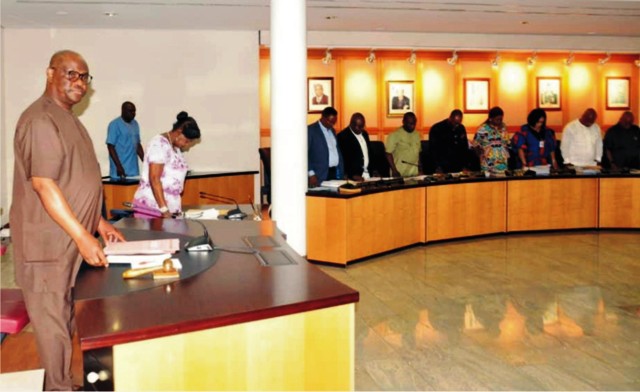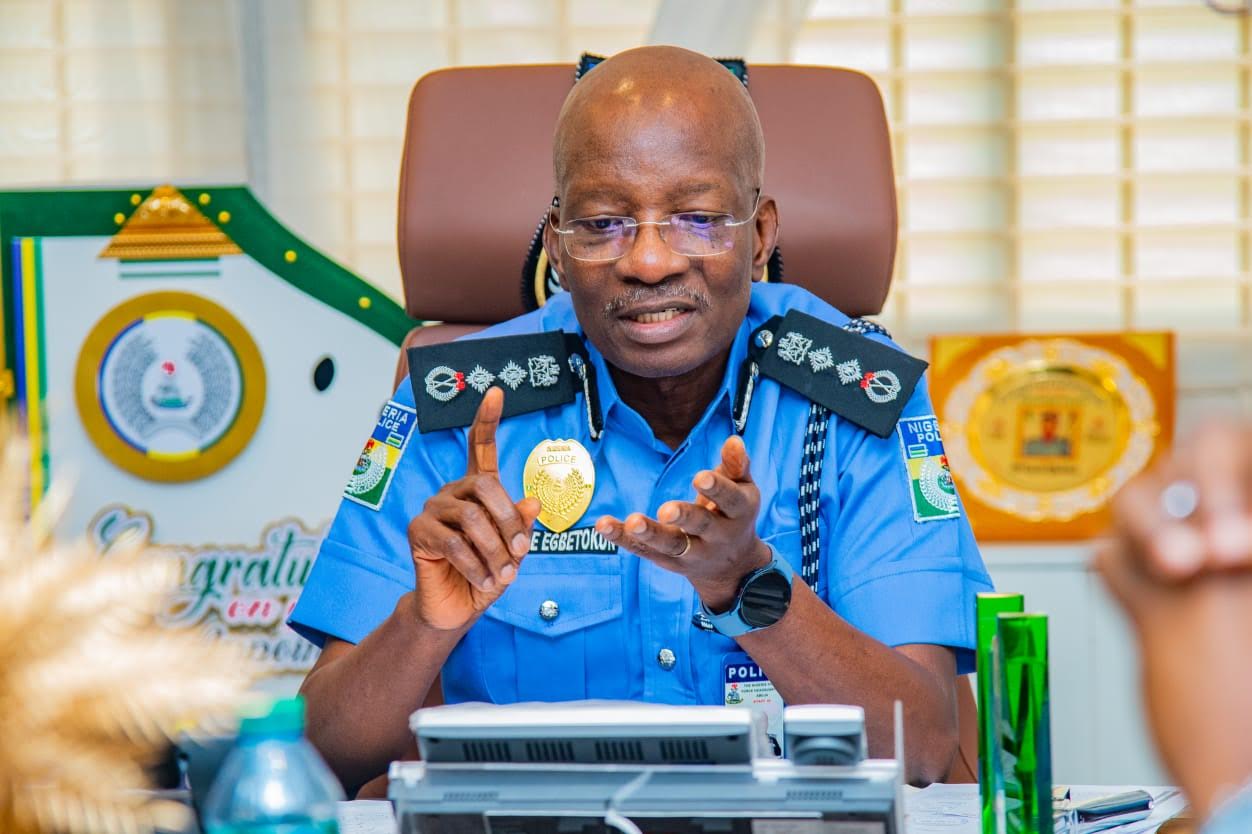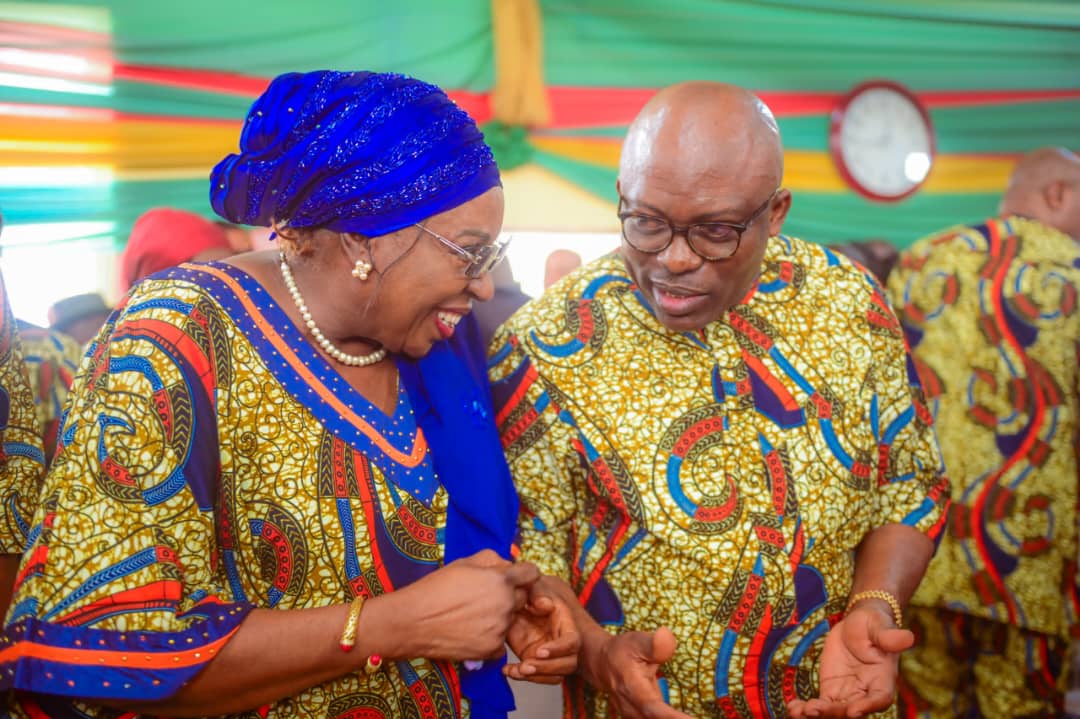News
Wike Moves To Resolve Pension Challenges …As CPS Bill Passes Ist Reading At RSHA

In line with his campaign pledge to address the challenge faced by pensioners under the Contributory Pension Scheme (CPS), Rivers State Governor, Chief Nyesom Wike has sent an executive bill to the Rivers State House of Assembly to reform the scheme.
The bill is part of efforts to review of the state Contributory Pension Scheme of 2012 as a way of addressing the plight of pensioners and civil servants in the state.
The Tide learnt that the new bill is designed to reform the old law towards to allow civil servants and pensioners have easy access to their retirement benefits.
Speaker of the House, Rt. Hon. Ikuinyi-Owaji Ibani, who read the letter of the governor on the floor of the Assembly, yesterday, said that the new bill was fashioned to review the previous law.
Tagged, Rivers State Pension Reform Bill 2019 (HA 23), Ibani said that the bill was aimed at putting to an end the sufferings of pensioners in the state.
He explained that the Contributory Pension Scheme introduced by the previous administration led to the exclusion of some pensioners from the state pension scheme due to the deficiencies in the enabling law.
The speaker said that the bill, when passed, would address the concerns of all retired employees of the Rivers State Government.
Also speaking, Majority Leader, Hon. Martin Amaewhule, who presented the bill on the floor of the House, opined that when passed into law, it would provide a smooth pension system that would address the needs of all civil servants and eliminate challenges in the old contributory pension scheme.
Amaewhule said that the Rivers State Pension Reform Bill from the governor seeks to repeal the Rivers State Contributory Pension Scheme Law of 2012.
The bill seeks to repeal the Rivers State Contributory Pension Scheme for Employees in the Public Service Law (No.7 of 2009) and the Rivers State Contributory Pension Scheme for Employees Law (Amendment No.1 of 2012).
He announced that when passed, the bill would substantially eliminate the impediments associated with the implementation of the pension scheme in the state.
The House leader further stated that the bill would eradicate the inherent challenges with the existing legal and policy frameworks for effective pension administration in the state and put smiles on the faces of pensioners.
According to the new bill, contribution of both state and local government councils in the state shall be charged on consolidated revenue fund.
According to the provisions of the new bill, “contributions payable by any other employer under this law shall be a charge on statutory allocation and subvention.
“An employee shall not make any withdrawal from his retirement savings account. Every employee in Rivers State Public Service shall retire at the age of 60 years.”
The new bill also provides that “a holder of retirement savings account shall, upon retirement, utilize the balance standing to the credit of his retirement savings account through programmed monthly or quarterly withdrawals calculated on the basis of an expected lifespan.”
It further recommended that “there shall be annuity for life purchase from an life insurance company.”
Finally, “the rate of contribution by the employee shall be 7.5 percent and 7.5 percent by employer. And the employer can agree to bear the full burden of the monthly emoluments of the employee,” the bill statement.
Shortly after it was read, the bill passed its first reading, as the House adjourned till tomorrow for more deliberations on the matter.
The second reading of the bill will take place tomorrow at 10am to allow for debate by lawmakers before a public hearing in line with the Standing Orders of the House.
News
Retirement: Ignore PSC’s Directive, Remain In Office, IGP Tells Officers

The Inspector General of Police, IGP Kayode Egbetokun, has instructed all police officers affected by the recent directive from the Police Service Commission (PSC) to disregard the order.
The PSC had directed officers who have served 35 years or reached 60 years of age to retire immediately.
A wireless message from the office of the Force Secretary, dated February 11, 2025, stated that the IGP “strongly directs all officers affected by the PSC’s directive to stay action, pending further instruction.” Officers were told to comply strictly with this order.
Last week, PSC spokesman Ikechukwu Ani, explained that the commission’s order followed a review of its previous stance from the 24th plenary meeting in September 2017, allowing force entrants to use their enlistment date rather than their initial appointment date.
The commission cited inconsistencies with Public Service Rule No. 020908, which mandates retirement after 35 years of service or upon reaching 60 years of age.
However, the PSC clarified that it does not have the constitutional authority to determine the appointment or retirement of IGP Egbetokun.
News
Be Consoled, God Who Gives, Also Takes, Fubara Tells Principal Secretary

Rivers State Governor, Sir Siminalayi Fubara, has extolled the sterling motherly virtues of late Mama Ayebadieye Edward Igbeta, and urged the children not to deviate from those valuable lessons she had taught them.
Late Mama Ayebadieye Edward Igbeta (79 years) is the mother of Dr Ayebaesin Jacob Beredugo, the Principal Secretary to Governor Fubara.
The Rivers State Governor, who described Dr Beredugo as a brother, trusted ally and key stakeholder of his administration, urged him to be consoled in God and bear the loss with fortitude.
Governor Fubara gave the advise at the funeral service in honour of late Mama Ayebadieye Edward Igbeta at the Cathedral Church of St Luke, Anglican Communion in Nembe City, Nembe Local Government Area of Bayelsa State yesterday.
The Rivers State Governor said: “We are here as a government to show that in this difficult time, we stand with him. We know that there is no consolation here that can fill the gap of this loss, more especially the loss of a mother.
“But, we want to draw his mind to the good Book: that it is the Lord that giveth, and it is also the Lord that taketh. And he takes for a reason.
“We live in a corrupt world, and when you are a saint in the world, when it pleases the Almighty and He believes that He doesn’t want you to be corrupted, He takes away the soul to a better place where death is no more, where you don’t have to look for food again, where you have peace.”
Governor Fubara expressed strong belief that given the way Mama had lived and the good virtues that had been read out and said about her, there is no doubt that she will be in a good side in heaven.
The Governor decried the current condition of the cathedral where the funeral service held and committed the support of the Rivers State Government to ensure the completion of the building in memory of late Mama Ayebadieye Edward Igbeta
“We have been made to understand that the Cathedral needs strong support. We are willing to support the completion of the Cathedral. We will support the building in memory of Mama with the sum of N50million”
Delivering the sermon on the topic; “Hope in the face of death”, Bishop of the Diocese of Western Izon, Rt. Rev. Victor Okporu, said those who are confidently expecting positive future must also believe in Jesus Christ, repent of their sins, and be prepared to spend eternity with Him.
Reading the biography of the late Madam Ayebadieye Edward-Igbeta, brother of the decreased, Mr Godwin Ekine, said his late sister was an embodiment of love, care, peaceful and kind-hearted, and touched lives through her generosity and compassion.
Friends and well-wishers from Bayelsa, Rivers and Delta states, some of whom shared fun memories of the late matriarch, were later hosted to a funeral reception at King Koko’s Square in Nembe Town.
Also at the burial were the State Deputy Governor, Prof Ngozi Odu; Speaker, Rivers State House of Assembly, Rt Hon Victor Oko-Jumbo; member representing Ikwerre/Emohua Federal Constituency in the National Assembly, Hon Boniface Emerengwa; and Chief of Staff, Government House, Dr Edison Ehie.
Others are Head of Service, Dr George Nwaeke; Attorney General and Commissioner for Justice, Dagogo Israel Iboroma, SAN, Dr Tamunosis Gogo-Jaja; Chief Hanny Woko; Amaopusenibo Fubara Hart; Chief Theodore Georgewill; members of the State Executive Council; Special Advisers; top politicians, leaders and stakeholders in the State; among others.
News
Old Boys Plan Rehabilitation Of GSS, Okehi
The Chairman of the Old Boys Association of Government Secondary School (GSS), Okehi Etche, Rivers State, Prof. Sir, Umunna Offor, has stated that the association would soon visit their alma-mater and rehabilitate decayed infrastructure and facilities in the compound.
The chairman made this assertion while speaking with some newsmen after an extensive meeting of the Old Boys in Port Harcourt, recently.
Sir Offor stated that since they left the secondary school, some years ago, most of the facilities and infrastructure built by then Rivers State Government had decayed and worn out.
“ However, being responsible ambassadors and Old Boys of the college, we would not fold our arms and expect government to rebuild everything in the school compound, hence, we have decided to come together and graciously assist our alma mater’, he said.
“The meeting was basically for like-minds to gather to find a way to help the school, it is a thing of joy to see and receive old school friends and comrades who have gone far in life and have excelled in their respective chosen fields”.
Speaking in the same vein, Engr, Lasbrey Amadi; (FNSE), who is also an old boy and former member of the House of Representatives, said the association would be working in synergy with the administrators of the school to ensure that in no distant time; there would be a massive face-lift in the physical infrastructure in the school compound.
Veering into politics in Nigeria of today, Engr, Amadi, said that god-fatherism in politics had seriously killed the gains and beauty of democracy in Nigeria and quickly urged politicians to always play-down the issue of god-fatherism in politics and ensure good governance in the country.
In his comment, the Public Relations Officer (PRO) of the Association, Mr Goodluck Nwaobilor, said the door of the association is still wide open for new members who finished from the school to join and work towards taking the association to higher level.
-
Niger Delta3 days ago
NACAT Inaugurates South-South Office In A’Ibom Against Corruption
-
Sports3 days ago
AFCON: Eguavoen, Emenike predict S’ Eagles’ chances
-
Rivers14 hours ago
Appreciate God, Elder Statesman Urges Nigerians
-
Business3 days ago
Bayelsa Recommits To Infrastructure, Sectoral Dev … Rakes In N227.185b From IGR
-

 Featured17 hours ago
Featured17 hours agoTUC Opposes FG’s Proposed Toll Gate On Federal Roads, Rejects Electricity Tariff Hike
-

 News13 hours ago
News13 hours agoBe Consoled, God Who Gives, Also Takes, Fubara Tells Principal Secretary
-

 News3 days ago
News3 days agoS’South Deputy Govs Pay Condolence Visit To A’Ibom Colleague
-

 Niger Delta3 days ago
Niger Delta3 days agoHYPREP Presents Scholarship Grants To 300 Ogoni Postgraduate Students

